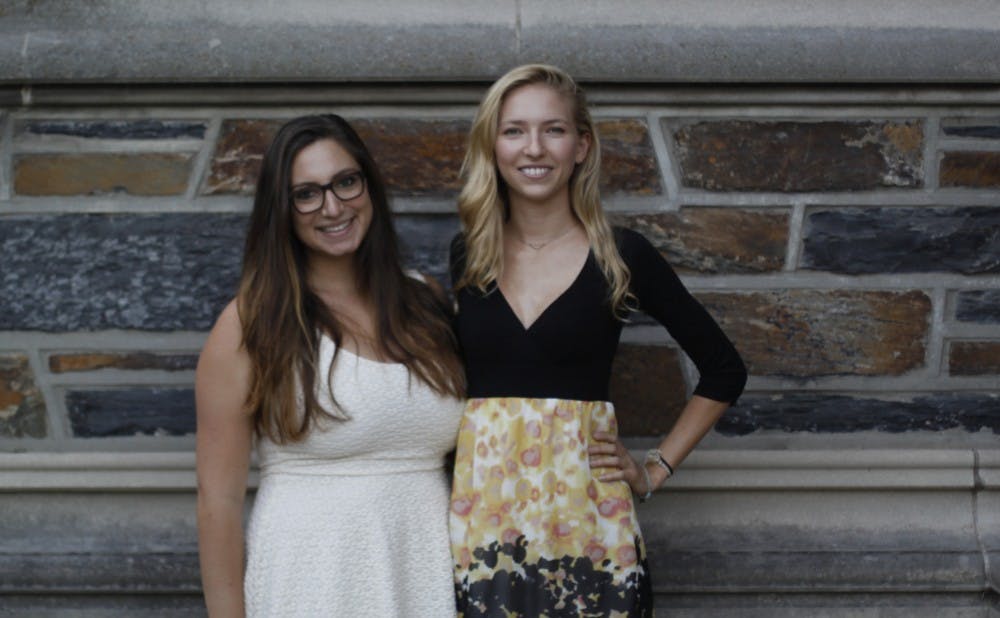Seniors Emily Briere and Lauren Silverstein are literally rocket scientists. Combined, the two Pratt School of Engineering students have worked with four different space companies—Briere at NASA Ames Academy and Lockheed Martin, and Silverstein at Honda Aircraft Company and SpaceX. The Chronicle sat down with Briere and Silverstein to discuss women in STEM fields and their current project to land time capsules on Mars.
The Chronicle: What originally attracted you to STEM fields as a student?
Emily Briere: I grew up with a scientist mom. So in addition to having a toy room, we had a science lab where we did science experiments. And my dad was an entrepreneur so he was always challenging us to fix problems. So there was a science influence in my life and this innovation influence. I always thought they were really separate. I only realized my first year in college that I could use them together by attacking problems through engineering. In particular, I was always fascinated with space and the concept that space can go on forever.
Lauren Silverstein: My story is kind of the opposite. I'm the only scientist or engineer in my family. I grew up mostly with a humanities background. I was inspired in high school by my physics teacher in my junior year. He had studied engineering, and that was my first real intro to it. I started doing a kind of hands-on project. For my first hands-on project, I built a human snow globe. As soon I started using my hands, I knew I had to do this and do something engineering-esque.
TC: How does Duke facilitate having women in STEM fields?
EB: So, it's definitely interesting that, besides our basic sciences, I can't think of a class where I've ever had a female professor. We are definitely used to being around a lot of men. At the same time, I've never gotten an impression of any favoritism toward males. Duke seems pretty even in terms of the ratio, even though only one-third of the engineers are female.
TC: What are you two currently working on?
EB: One of the major projects that Lauren and I are working on right now is Time Capsule to Mars. This whole concept started when a couple of us—myself, my younger brother Chris, my father Danny and [president of Remarkable Technologies] Eric Knight—were at the Humans to Mars conference by Explore Mars. We were looking at all the technical presentations and thinking that there has to be a way to, one, get space to be more interesting, two, get students more involved, and, three, get a lot of this really cool technology that is being invented into space.
The goal of the project is to land several time capsules on the surface of Mars. Eric and Danny discovered the propulsion being developed at the Space Propulsion Lab at Massachusetts Institute of Technology, which we have been working with ever since. The actual time capsule itself is being constructed by students at Duke, MIT, Georgia [Institute of Technology], Stanford [University], [University of Connecticut] and [University of Colorado Boulder].
Explore Mars is our kind of governing organization, but we have an incredible advisory board that includes people like [former astronaut] Buzz Aldrin on it. The most exciting part is the technology that we are testing—we will be getting back $25 million worth of data.
LS: Right now, we are doing a crowd funding campaign from [our] website [to fund the project]. You can upload audio, pictures and video for 99 cents.... Eventually, we're going to do a Kickstarter campaign in the fall.
EB: We've currently raised $1 million in in-kind support so far. This was enough for us to fund two graduate student scholarships to work full-time on this project.
TC: What are your thoughts on the current status of women in STEM fields?
EB: Obviously there aren't as many women as there are men. There are also definitely some double standards. For instance, if a woman is super demanding and very on top of her stuff, it can come across as annoying and rude. If a male did that, it's expected and business-professional. You get used to it pretty quickly and learn to have firm handshakes and business cards ready.
Megan Smith, the vice president of GoogleX, told me that oftentimes, people will excuse you for having one thing different. Maybe you're a female. That's okay. If you're young and a female, or female and a different race, it can be harder. People will have a harder time taking you seriously. She also talked about how there are a million people that will say an idea is stupid. But one person will say yes. So, surround yourself with people that believe in you, not with people that are going to say no.
LS: My mentor-figure is Gwynne Shotwell, who is the President [and CEO] of SpaceX. She gave a talk to the interns. Someone asked her if she ever felt intimidated being a female in a male industry. She responded by telling us to never walk into a room thinking that you are the only woman in the room. As soon as you let that into the room, it can become a hindrance. In terms of where we hope the future will lead, I kind of hope that eventually this isn’t even a question. I hope that it becomes the norm one day, and people stop questioning it.
Get The Chronicle straight to your inbox
Sign up for our weekly newsletter. Cancel at any time.

